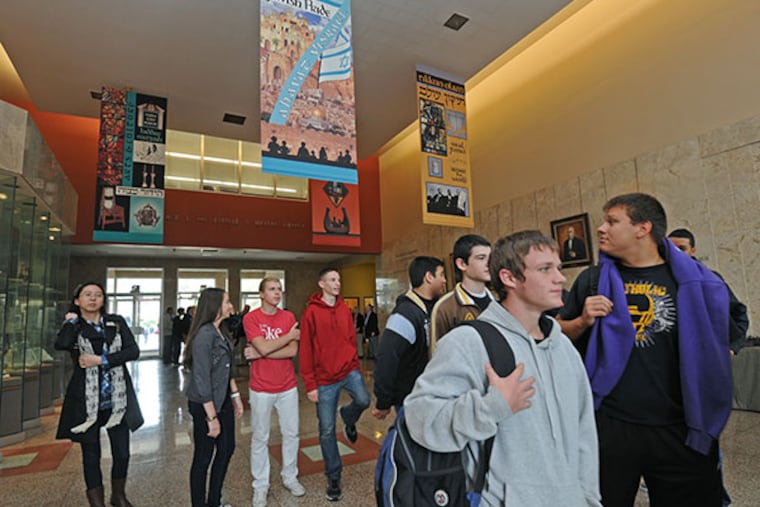Despite the shutdown, students get a fuller Holocaust experience
The government shutdown ruined plans of Lancaster high school students to visit the Holocaust Museum in Washington, but a Philadelphia group jumped in Wednesday to offer a vivid firsthand lesson of the 20th century's great horror.

The government shutdown ruined plans of Lancaster high school students to visit the Holocaust Museum in Washington, but a Philadelphia group jumped in Wednesday to offer a vivid firsthand lesson of the 20th century's great horror.
"They called us and their first question was, 'Are you open?' " said Phil Holtje, program director of the Holocaust Awareness Museum and Education Center in Northeast Philadelphia.
The center was open. But the theater and bigger rooms at the Klein Jewish Community Center, where the museum is housed, were already booked.
Museum president Chuck Feldman quickly contacted Ruth Hartz, who survived the Holocaust as a child, and she reached out to her synagogue, Keneseth Israel in Elkins Park.
Shortly after 11 a.m., two tour buses rolled to a stop outside the synagogue, and seniors from Lancaster Catholic High School filed into the soaring, stained-glass sanctuary.
"It was today or nothing," said English teacher Leslie Laird, who helped organize the Washington trip as part of her classes' studies of the Holocaust.
The partial government shutdown - which after 16 days appeared poised to end Wednesday night - closed not just the Smithsonian museums on the Mall but others that depend on federal funding, including the U.S. Holocaust Memorial Museum.
The museum ranks among America's most popular, hosting more than 34 million visitors since it opened in 1996. Its vast holdings include the technical, such as a detailed model of the gas chambers and crematoria at the Auschwitz-Birkenau death camp, and the emotional, including a pile of 4,000 shoes that the Nazis took from their victims.
The local Holocaust Museum houses fewer artifacts in a smaller space. But on Wednesday it, too, offered something special.
At the front of the sanctuary, slowed by age but strong of spirit, stood Ernie Gross, 84, who survived both Auschwitz and the Dachau concentration camp, and Don Greenbaum, 88, who as a GI helped liberate Dachau in April 1945.
"Two heroes," Feldman said.
And two men challenged by their task: To explain the enormity of the World War II genocide to a generation that hardly recognizes the name Eisenhower.
Some students yawned as the men spoke. Others closed their eyes. Most sat rapt, particularly when Gross began rummaging through a bag he had set in front of him.
What was inside? Several items.
A cup, which served as Gross' drinking glass and dinner plate in the camps. He carried it on a string around his neck, a possession too valuable to lose.
Next emerged a loaf of bread. Too small to feed one man, it was divided among eight in the camps, where every morsel could mean the difference between life and death.
Gross told how he watched a father and son quarrel over who deserved the minutely larger slice, the younger man insisting on keeping it, snapping, "I'm just as hungry as you."
"In the camp," Gross told the students, "there is no father, son, brother, uncle. . . ."
Last he brought out a potato, plain and brown. Gross recalled how a fellow prisoner, a friend from his native Hungary, had somehow miraculously obtained the tuber.
Gross begged to be given just the skin. His friend thought it over, then said no - he needed it to survive.
In spring 1945, a struggling and suffering Gross was shocked to suddenly see the German guards throw down their weapons and run. American forces were advancing on Dachau, 10 miles northwest of Munich.
"An odor hit us," said Greenbaum, on that day a 19-year-old forward artillery observer. Nearly 70 years later, the smell is still with him, the stench of scores of dead and decaying bodies.
Among the German soldiers they met that day, Greenbaum said, his unit took no prisoners.
He grew stern when discussing how some people and organizations claim the Holocaust never occurred, that six million Jews were not murdered.
"I know it happened, because we were there," Greenbaum said.
He and Gross, though both present at Dachau's liberation, did not meet until decades later, when Gross began searching for soldiers who had taken part.
From the synagogue crowd came questions: Did Greenbaum face anti-Semitism after the war? (No, but friends did.) Did Gross lose faith in God in the camps? (Not for a minute.)
None of the students seemed disappointed at missing a trip to Washington, having gained the chance to talk to people who actually lived through the genocide.
"To hear it firsthand," said Kylee Legenstein, 17, "was really cool."
Her friend Andrew Speitel agreed.
"Anyone can go to the Holocaust museum," said Speitel, 17, "but not everyone gets this experience."
215-854-4906
@JeffGammage